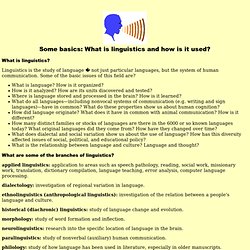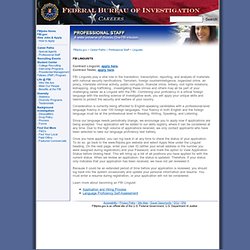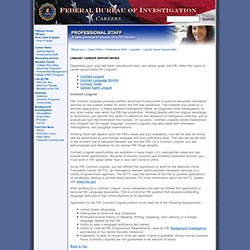

Syllabus. Some basics: What is linguistics and how is it used. Some basics: What is linguistics and how is it used?

What is linguistics? Linguistics is the study of language not just particular languages, but the system of human communication. Some of the basic issues of this field are? What is language? How is it organized? Applied linguistics: application to areas such as speech pathology, reading, social work, missionary work, translation, dictionary compilation, language teaching, error analysis, computer language processing. dialectology: investigation of regional variation in language. ethnolinguistics (anthropological linguistics): investigation of the relation between a people's language and culture. historical (diachronic) linguistics: study of language change and evolution. morphology: study of word formation and inflection. neurolinguistics: research into the specific location of language in the brain. paralinguistics: study of nonverbal (auxiliary) human communication. phonetics: description of how speech sounds are articulated and heard.
What Are the Different Types of Linguistics Studies? - mobile wiseGEEK. What's a Cryptologic Linguist? Overview A cryptologic linguist is primarily responsible for identifying foreign communications using signals equipment.

Their role is crucial as the nation’s defense depends largely on information that comes from foreign languages. Job Duties Identifying and analyzing foreign communications Recognize changes in transmission modes and tip the appropriate authority Provide translation expertise to analysts Provide transcriptions and translations from foreign communications Requirements Those who want to serve must first take the Armed Services Vocational Aptitude Battery, a series of tests that helps you better understand your strengths and identify which Army jobs are best for you. Training Job training for a cryptologic analyst requires 10 weeks of Basic Combat Training and three to 52 weeks of Advanced Individual Training with on-the-job instruction.
Some of the skills you’ll learn are: Helpful Skills Required ASVAB Score(s) Skilled Technical (ST) : 91 - Learn more about the ASVAB Compensation. Federal Bureau of Investigation. Contract Linguist, apply here.

Contract Tester, apply here. FBI Linguists play a vital role in the translation, transcription, reporting, and analysis of materials with national security ramifications. Terrorism, foreign counterintelligence, organized crime, air piracy, interstate criminal activity, public corruption, financial crime, bribery, civil rights violations, kidnapping, drug trafficking...investigating these crimes and others may all be part of your challenging career as a Linguist with the FBI. Combining your proficiency in a critical foreign language with the exciting science of investigative work, you will apply your unique skills and talents to protect the security and welfare of your country. Consideration is currently being afforded to English-speaking candidates with a professional-level language fluency in over 100 foreign languages.
Since our language needs periodically change, we encourage you to apply now if applications are being accepted. Federal Bureau of Investigation. Depending upon your skill level, educational level, and career goals, the FBI offers four types of career opportunities for Linguists: Contract Linguist FBI Contract Linguists primarily perform document-to-document or audio-to-document translation services on any subject matter for which the FBI has jurisdiction.

The material may relate to a terrorist organization, a highly sensitive intelligence matter, an organized crime investigation, or any other matter over which the FBI has jurisdiction. Working directly with the original recordings or documents, you are the first person to determine the relevance of intelligence collected, and to analyze and put the information into context. On occasion, Contract Linguists render translations from English into the target language. Working hours will depend upon the FBI's needs and your availability. Contract Linguist opportunities are available in many major U.S. metropolitan areas and can include travel opportunities. Back to Top Contract Tester. Linguistics 101: An Introduction to the Study of Language. (Source: An Introduction to Language by Victoria Fromkin and Robert Rodman, 6th Ed.)

Part One: Introduction to Linguistics Every human knows at least one language, spoken or signed. Linguistics is the science of language, including the sounds, words, and grammar rules. Words in languages are finite, but sentences are not. It is this creative aspect of human language that sets it apart from animal languages, which are essentially responses to stimuli. The rules of a language, also called grammar, are learned as one acquires a language. Knowing a language encompasses this entire system, but this knowledge (called competence) is different from behavior (called performance.) There are two types of grammars: descriptive and prescriptive. There are about 5,000 languages in the world right now (give or take a few thousand), and linguists have discovered that these languages are more alike than different from each other.